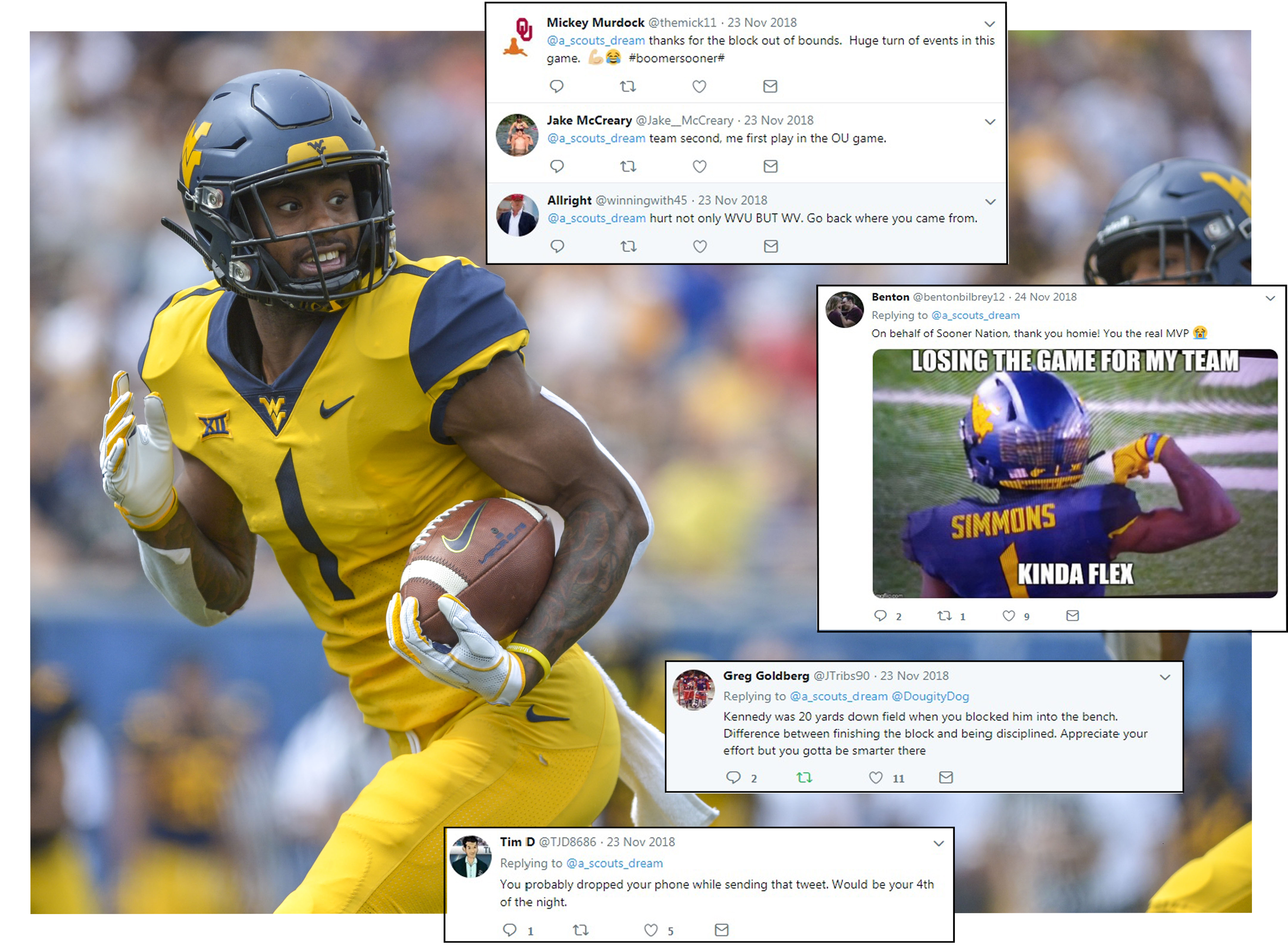MORGANTOWN, W.Va. — T.J. Simmons was already having a bad day.
With a trip to the Big 12 championship game hanging in the balance and West Virginia driving for a go-ahead fourth quarter touchdown against Oklahoma, the Mountaineers wide receiver was penalized for unnecessary roughness after he continued to block Sooners cornerback Tre Brown out-of-bounds.
Instead of having a first-and-goal inside the 5, the Mountaineers were back at midfield. Two plays later, the Sooners were the ones crossing the goal line after a strip-sack of Will Grier, effectively squashing a season worth of hopes.
When Simmons turned his phone on after the game, matters only got worse. Plenty of fans from both West Virginia and Oklahoma piled the blame for the loss on Simmons via social media.
“On behalf of Sooner Nation, thank you homie! You the real MVP,” crowed one Oklahoma fan.
A West Virginia fan whose Twitter feed largely consists of angry rants against political figures decided to share some of his vitriol with Simmons on this occasion.
“@a_scouts_dream hurt not only WVU BUT WV. Go back where you came from!” the tweet foamed from its mouth.
There were several others sharing similar sentiments to those two fans. They didn’t get to Simmons, though.
“A lot of people blamed me for the Oklahoma game,” Simmons said. “But I was around friends and family. They told me it was a great play; I’ve been blocking people to the fence since high school. The people on Twitter and Instagram, I tried to ignore them, for real.”
For Simmons, the ugly side of social media still isn’t ugly enough to overcome what he perceives as the benefits.
“Nowadays, social media is a big deal,” Simmons said. “Coach [Neal] Brown and his staff are doing a good job of trying to get us a social media presence because you want people to know who you are. You want to build that fanbase.
“So when we do go to the NFL, you already have a foundation of people that support you. It’s more good than bad on social media. That’s why I stay on.”
Defensive end Reese Donahue agrees that the power to interact with fans who would have had a wall of separation from players in previous generations is a good thing.
“I think it probably differs between people, but I want people to know me,” Donahue said. “I grew up watching the Owen Schmitts and Pat Whites and Steve Slatons, and I wish I could know more about them. I idolized them growing up.
“I don’t want to be idolized, but I want people to know I’m a real person. If someone asks for my autograph after a game and they’re surprised I say yes, that’s not how it should be.”
Donahue hasn’t experienced anything quite like Simmons has in terms of ugliness. But he has seen what some people on social media say to coaches and teammates, and wishes people would act the same way online that they do in person.
“We’re people behind those Twitter accounts. We’re not just a picture and all that,” Donahue said. “I think maybe even me saying something about that helps bring that to light. It’s a sport. It’s a game. We are here to get our education. Hopefully, to better ourselves and pursue football at the next level and make some money doing it.
“But just because we’re athletes in helmets, I don’t think you would come up to me and say things [like that] off the field.”
If a player messes something up in a game, they don’t need anyone else pointing it out. They know better than anyone.
“You see people walking around the locker room for a week [with their heads down], they don’t need the pressure from outside sources,” Donahue said.
Perhaps because he’s been through it, Simmons said the outside noise isn’t that big of a deal. Angry tweets are one thing. Angry teammates are a whole different story.
“At the end of the day, it’s about what I think about myself and what my coaches and teammates think about me,” Simmons said. “If they don’t have a problem with it and they’re encouraging me, it doesn’t matter what the people on the outside say. They’re not here working with me in the summertime. They’re not running with me and practicing with me.”
Twitter @bigahickey




